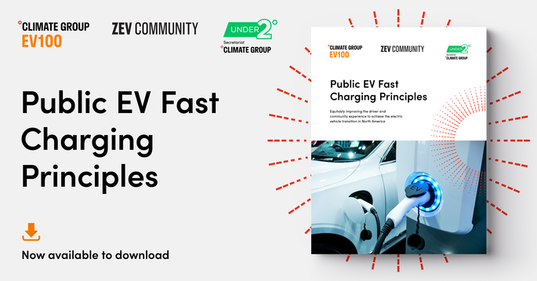The EV revolution is here, and we need reliable public fast charging infrastructure to accelerate the transition to an all-electric future. Today, EV100 and ZEV Community members released ‘Public EV Fast Charging Principles’ to guide the critical development of charging infrastructure and enable mass electric vehicle (EV) uptake in North America.
Download the Public EV Fast Charging Principles now.
Transportation is the largest source of emissions in the US and second largest in Canada. As such, electrifying transport is critical to reducing emissions and reaching crucial climate targets as well as improving transport-related air and noise pollution and improving public health.
In the US, the Biden administration recently passed the Bipartisan Infrastructure Investment and Jobs Act. Among the many historic accomplishments, it grants the Department of Transportation, $7.5 billion to invest in building out a national EV charging network. Building an accessible charging network that allows interoperability, open access, and easy payment will enable all drivers to fully transition to electric.
“As EVs increasingly become the new normal, it is crucial to have reliable charging infrastructure. Key EV100 and ZEV Community members joining forces to support these charging principles demonstrates the urgent demand and need for a reliable, accessible public fast charging network that can enable EV adoption and stimulate the transition to electric."
“As EVs increasingly become the new normal, it is crucial to have reliable charging infrastructure. Key EV100 and ZEV Community members joining forces to support these charging principles demonstrates the urgent demand and need for a reliable, accessible public fast charging network that can enable EV adoption and stimulate the transition to electric."
“From planning to operations, these principles from EV100 and ZEV Community will help ensure positive customer charging experience as the United States advances its transition to electrified transportation. At Siemens, we are particularly encouraged by the easy-payment and open access principles, as we actively support interoperable and accessible EV charging for all.”
“From planning to operations, these principles from EV100 and ZEV Community will help ensure positive customer charging experience as the United States advances its transition to electrified transportation. At Siemens, we are particularly encouraged by the easy-payment and open access principles, as we actively support interoperable and accessible EV charging for all.”
There are just over 51,000 EV charging stations in the US and parts of Canada. Current deployments are far from the over one million mix of public Level 2 and DCFC stations needed in the US by 2030. Beyond increasing the number of public fast charging stations, one of the most important factors to accelerate the EV transition is the need for a reliable, seamless, and top-class driver charging experience.
Currently, the EV charging experience for drivers is unreliable. Chargers are often broken, incorrectly advertised by operators and overly complicated, hindering EV adoption for fleets and the public. Business and fleet manager efficiency, effectiveness and ability to transition to electric transport depends on reliable infrastructure. The new principles released by EV100 and ZEV Community members provide an effective pathway for EV infrastructure development that will reassure drivers and encourage EV adoption.
“Reliable and interoperable electric vehicle charging infrastructure, key tenets of EV100 and ZEV Community’s Public EV Fast Charging Principles, are foundational to the transition to electric transportation—which will reduce costs to consumers, create jobs, and cut emissions. ABB has been manufacturing EV chargers for over a decade, having sold over 500,000 chargers to all parts of the transportation industry. With the passage of the Infrastructure Investment and Jobs Act, ABB is proud and excited to continue to bring our experience and commitment to quality to all Americans making the switch to electric."
“Reliable and interoperable electric vehicle charging infrastructure, key tenets of EV100 and ZEV Community’s Public EV Fast Charging Principles, are foundational to the transition to electric transportation—which will reduce costs to consumers, create jobs, and cut emissions. ABB has been manufacturing EV chargers for over a decade, having sold over 500,000 chargers to all parts of the transportation industry. With the passage of the Infrastructure Investment and Jobs Act, ABB is proud and excited to continue to bring our experience and commitment to quality to all Americans making the switch to electric."
This is a critical opportunity to develop necessary supportive charging infrastructure to further the EV revolution. These public fast charging principles will help address major EV uptake issues and enable the transition to electric transport across North America. We look forward to working with federal leaders in the US and Canada to help support the implementation of a robust, reliable charging network that is accessible to all.
